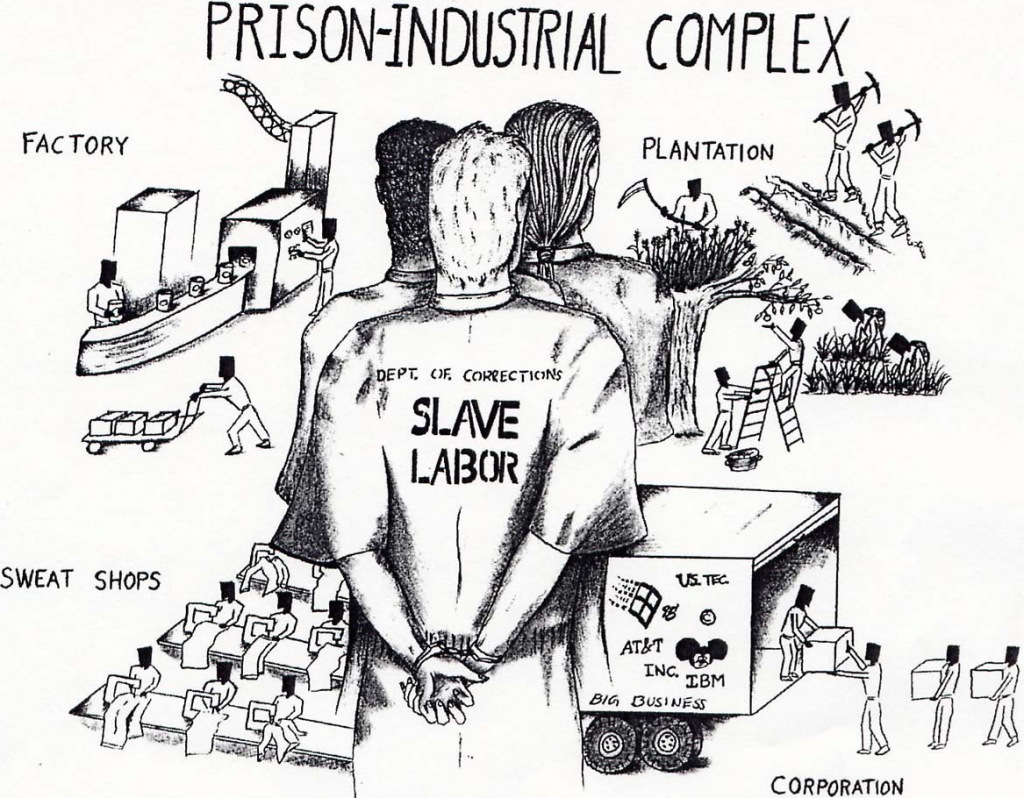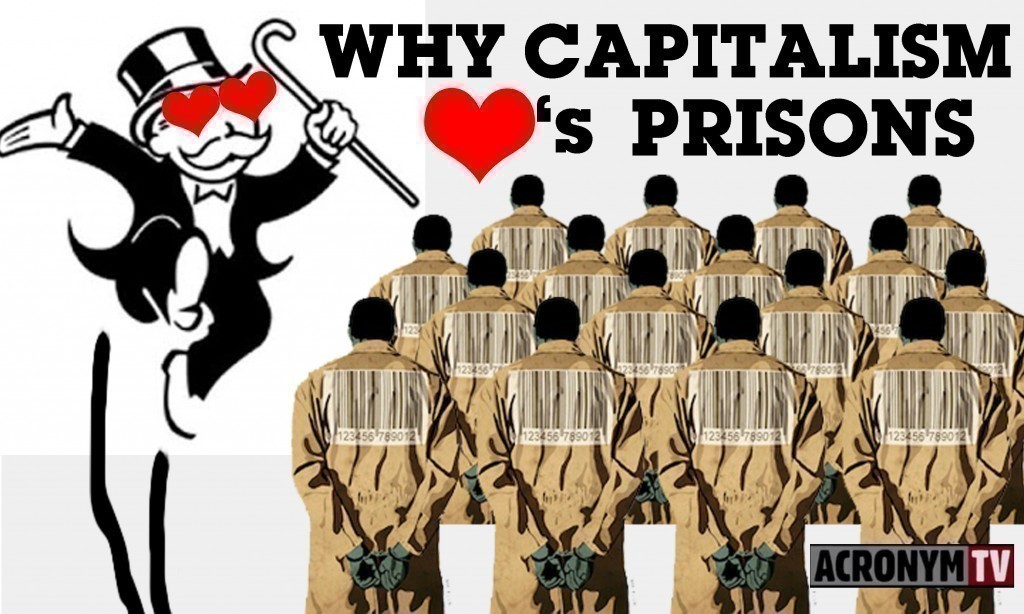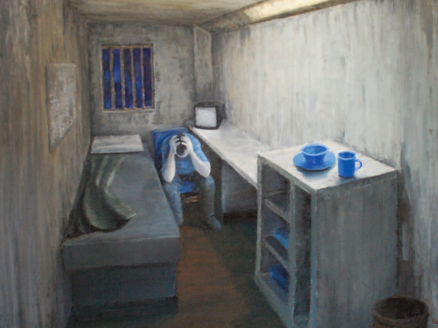Prison Industrial Complex
What is the Prison Industrial Complex?
 The Prison Industrial Complex (P.I.C) is a term used to describe the overlapping interests of government and industry that use surveillance, policing and imprisonment as solutions to economic, social and political problems.
The Prison Industrial Complex (P.I.C) is a term used to describe the overlapping interests of government and industry that use surveillance, policing and imprisonment as solutions to economic, social and political problems.
- The Prison Industrial Complex is not just prisons themselves, it is mutually reinforcing web of relationships, between and not limited to, for example, prisons, the probation service, the police, the courts, all the companies that profit from transporting, feeding and exploiting prisoners, and so forth.
- The UK currently has the most privatised prison system in Europe. Its cultural embrace of surveillance, policing and repressive policies are making it open ground for companies seeking to exploit the custodial markets in the UK.
- Thousands are criminalised, imprisoned and controlled, individuals and families are harmed and traumatised and poverty is perpetuated to allow a small minority of people to profit and for the state to maintain control over the population.
The P.I.C in pictures:
A video zine has been produced by organisers in North America that highlights the impacts of the prison industrial complex in the United States.
Communities Harmed by the Prison Industrial Complex
Several of groups of people are over-represented in the British Prison system. In few words: we are locking up our most vulnerable individuals, from the most criminalised communities. The patterns of which are entrenched in racism, sexism and class inequalities.
Some key facts about who is in prison in the UK:
- 27% of the adult prison population has been in care
- Almost 40% of prisoners under 21 were in care as children
- 72% of male and 70% of female sentenced prisoners suffer from two or more mental health diagnoses
- Over half of the women’s prison population has suffered domestic violence and 1/3 has experienced sexual abuse
- Over a quarter of the UK prison population is also from a minority ethnic group
Prison & Capitalism
C apitalism is an economic system in which a small number of people maintain ownership and control of the means of production (e.g. Machines, factories, land) and the ways of distributing and making money off those goods.
apitalism is an economic system in which a small number of people maintain ownership and control of the means of production (e.g. Machines, factories, land) and the ways of distributing and making money off those goods.
Two essential needs of capitalism are growth and expansion – e.g. New markets, new products, new colonial frontiers, land to exploit and so forth, as well as a surplus of labour. The prison industrial complex has effectively created a whole new industry to make the rich richer and profit from the caging of human beings. Prison is also a tool to control the ‘surplus labour’ (e.g. Real people with real lives and needs) of working class peoples.
“The prison has become a black hole in which the detritus of contemporary capitalism is deposited. Mass imprisonment generates profits as it devours social wealth, and thus it tends to reproduce the very conditions that lead people to prison”
– Angela Davis
What impact does the Prison Industrial Complex have?
 Prisons perpetuate and enable violence – putting someone in a cage is violent in itself. Prisoners experience violence in prisons themselves through physical and psycho-emotional assault, sexual assault and rape, harassment and neglect of many needs, especially health needs. Violence is also manifested in huge patterns of self harm and suicide, inside and outside prison, before and after sentences and interactions with the ‘criminal justice’ system.
Prisons perpetuate and enable violence – putting someone in a cage is violent in itself. Prisoners experience violence in prisons themselves through physical and psycho-emotional assault, sexual assault and rape, harassment and neglect of many needs, especially health needs. Violence is also manifested in huge patterns of self harm and suicide, inside and outside prison, before and after sentences and interactions with the ‘criminal justice’ system.
Families, lovers and friends of those subjected to the prison industrial complex are also harmed through our culture of locking people up. Thousands of relationships are daily affected as people are separated from their communities. Individuals can loose their jobs, homes and possessions, as well as loose or deeply effect their relationships with children, parents and other family, lovers, friends and social ties.
Our current system does not meet the needs of individuals who have experienced harm either. Individuals and communities fail to feel safer with the growth of prisons and the prison industrial complex. The legal system is exclusive, intimidating, ineffective at meeting people’s needs and supporting their confidence that harm will be reduced. Instead of asking, ‘Who did it and how can we punish them?’ which is the function of our courts, we ask ‘Who was hurt? How can we support their healing? How can we prevent such harm in the future?’
How can we reduce harm?
 IWOC are not blind to the fact that crimes committed by many people who end up in prison can and do harm other people, for example we would never minimise the harm of being raped, the feeling of violation through experiencing a robbery, the life-long memory of assault and so on. However we also recognise that the state is also responsible for harm, for example imprisoning people, enacting policy that creates and perpetuates poverty, war and more, and these two aspects – interpersonal harm and state harm are interlinked.
IWOC are not blind to the fact that crimes committed by many people who end up in prison can and do harm other people, for example we would never minimise the harm of being raped, the feeling of violation through experiencing a robbery, the life-long memory of assault and so on. However we also recognise that the state is also responsible for harm, for example imprisoning people, enacting policy that creates and perpetuates poverty, war and more, and these two aspects – interpersonal harm and state harm are interlinked.
We do not believe, nor is there evidence, that policing and imprisonment reduces harm. Caging people does not solve the social spirals of erosion in our societies that lead to harm such as drug abuse, poverty, violence, psycho-emotional health, or other aspects of oppression in our cultures which perpetuate harm.
Therefore as abolitionists we commit to designing and working for safe communities that genuinely reduce harm. See the resources section for more resources exploring these issues and ideas.